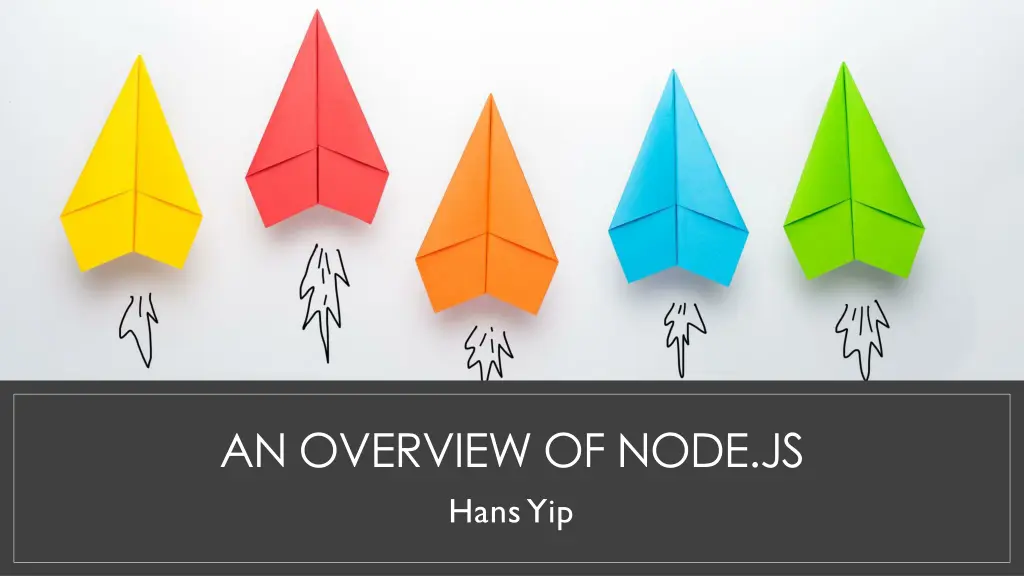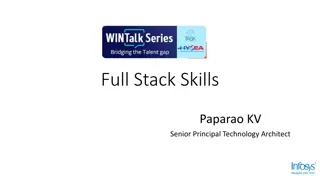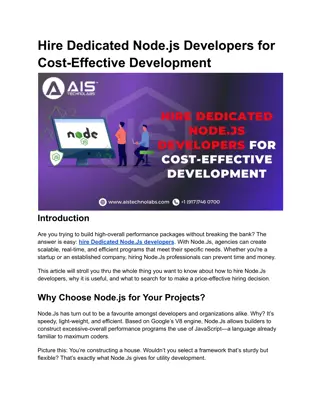
Exploring Node.js Fundamentals
"Learn about the key concepts of Node.js, including its non-blocking architecture, features, event loop processing, and single-threaded environment. Discover the background of Node.js and its evolution since its inception in 2009. Dive into essential topics such as Node Package Manager (NPM), callback concepts, and HTTP modules."
Download Presentation

Please find below an Image/Link to download the presentation.
The content on the website is provided AS IS for your information and personal use only. It may not be sold, licensed, or shared on other websites without obtaining consent from the author. If you encounter any issues during the download, it is possible that the publisher has removed the file from their server.
You are allowed to download the files provided on this website for personal or commercial use, subject to the condition that they are used lawfully. All files are the property of their respective owners.
The content on the website is provided AS IS for your information and personal use only. It may not be sold, licensed, or shared on other websites without obtaining consent from the author.
E N D
Presentation Transcript
AN OVERVIEW OF NODE.JS Hans Yip
Learning Objectives What is Node.js? Features of Node.js Node.js background Download and install Node.js Comparing blocking vs non-blocking Node Package Manager (NPM) Callback concept Node.js Modules HTTP module
What is Node.js? Node.js provides a non-blocking architecture using event loop processing based on single threaded JavaScript model and built on top of Google s V8 JavaScript Engine.
Features of Node.js: Non-blocking Non-blocking execution means asynchronous execution. All APIs of Node.js library are asynchronous and non-blocking. Node.js server never waits for an API to return data. Server moves to next API after calling it and a notification mechanism of Events of Node.js helps server to get response from the previous API call.
Features of Node.js: Event loop processing Event loop processing in Node.js is a programming style where the flow of execution is determined by events. Events are handled by event handlers or event callbacks. An event callback is a function that is invoked when something significant happens such as when the result of a database query is available.
Features of Node.js: Single Threaded Node is a single-threaded environment. At most, only one line of your code will ever be executing at any time. Note: event loop in Node.js is just one thread running inside one process, which means that, when an event happens, the event handler can run without interruption.
Node.js Background Node.js was invented in 2009 by Ryan Dahl along with other developers while working at Joyent. The Node.js Package Manager (NPM) was introduced in 2011, allowing publishing and sharing node.js source code by the community. Node.js was originally developed for the Linux environment. The first node.js to support Windows was released in July 2011. Node.js went through several technical changes including internal conflict over Joyent s governance, resulting Fedor Indutny (Node.js core team developer) in December 2014 starting io.js, a fork of Node.js.
Node.js Background In February 2015, the Node.js foundation was announced, providing the opportunity of merging Node.js and io.js communities together under the Node.js foundation. On Oct12, 2015, Node 4.2.0 (LTS) was announced, the first release covered under the new LTS plan (Long Term Support). Node s core functionalities are kept to a minimum. There are many third-party modules supporting Node.js and can be downloaded, installed, and managed using Node Package Manager (NPM) to expand node s functionalities.
Structures of Node.js Console Module Buffer Module dns Module Core Node.js express Module fs Module net http Module Module
Download and Install Node.js Download and install latest version of Node.js Instruction for windows O/S click here. Instruction for Mac O/S click here. Create a working folder (c:\nodejs_workspace). Check the Node.js version that just installed. Go to cmd terminal, enter: node --version (or node v)
Compare Blocking vs Non-blocking Blocking methods execute synchronously and non-blocking methods executes asynchronously. Using the File System modules, this is a synchronous file read: const fs = require("fs"); const data = fs.readFileSync("./test.txt"); console.log(data.toString()); console.log("This statement runs after read file!");
Compare Blocking vs Non-blocking Here is an equivalent asynchronous example: const fs = require("fs"); fs.readFile("./test.txt", (err, data) => { if(err) console.log("Read error!!"); console.log(data.toString()); }); console.log("This statement runs after read statement?");
Node.js Node Package Manager (NPM) Node Package Manager (NPM) provides two main functionalities: 1. Online repositories for Node.js packages/modules. 2. Command line utility to install packages, do version management and dependency management of Node.js packages. NOTE: NPM comes bundled with Node.js after v0.6.3 version. To verify the NPM version, go to cmd terminal, enter: npm --version (or npm v)
NPM Global vs Local Installation By default, npm installs any dependency (modules or packages) in the local mode. Locally deployed packages are accessible via require. Install express, a popular web framework using local installation (go to cmd terminal). c:\nodejs_workspace> npm install express Once npm completes the download, you can verify by looking at the content of c:\nodejs_workspace\node_modules Or type the following command: c:\nodejs_workspace> npm ls
NPM Global vs Local Installation Globally installed packages/dependencies are stored in <user-directory>/npm directory. Such dependencies can be used in CLI (Command Line Interface) function of any Node.js but can not be imported using require in Node application directly. Install express, a popular web framework using global installation. c:\nodejs_workspace> npm install express g Once npm completes the download, you can verify by looking at the content of <user- directory>/npm/node_modules. NOTE: <user-directory> = c:\Users\my_uid\AppData\Roaming Or type the following command: c:\nodejs_workspace> npm ls -g
Callbacks Concept Callback is an asynchronous equivalent for a function. A callback function is called at the completion of a given task. Node.js makes heavy use of callbacks. API_function("data_here", callback_function(var_data){ // cunction content }); OR (No name function) API_function("data_here", (var_data) => { // function content });
Callback sample For example (non-blocking) readFile(), a function to read a file may start reading file and return the control to execution environment immediately so that next instruction can be executed. Once file I/O is complete, it will call the callback function while passing the callback function, the content of the file as parameter. So there is no blocking or wait for file I/O. fs.readFile( location/file_name", callback_function()); console.log("This statement runs after read statement?");
Node.js Sync vs Async Write var fs = require('fs'); var out_data = 'Outdata line 1. \r\nOutdata last line.'; // Asynchronous write fs.writeFile('./output_async.txt', out_data, function (err) { if (err) console.log(err); console.log('Output Async file content: ' + out_data); }); // Synchronous write fs.writeFileSync('./output_sync.txt', out_data); console.log('Output Sync file content: ' + out_data); console.log('Program Ended.');
Node.js - Modules Module Name buffer console dns Description buffer module can be used to create Buffer class. console module is used to print information on stdout and stderr. dns module is used to do actual DNS lookup and underlying o/s name resolution functionalities. domain module provides way to handle multiple different I/O operations as a single group. fs module is used for File I/O. to make Node.js act as an HTTP server to make Node.js act as an HTTPS server domain fs http https
Node.js - Modules Module Name net os path process querystring url Description net module provides servers and clients as streams. Acts as a network wrapper. os module provides basic o/s related utility functions. path module provides utilities for handling and transforming file paths. process module is used to get information on current process. to handle URL query string to parse URL strings
Node.js HTTP Module Node.js has a built-in module called HTTP, which allows Node.js to transfer data over the Hyper Text Transfer Protocol (HTTP). Set up node.js as a Web Server: The HTTP module can create an HTTP server that listens to server ports and gives a response back to the client. Use the createServer() method to create an HTTP server. The function passed into the http.createServer() method, will be executed when someone tries to access the computer on port 8081.
http_server.js var http = require('http'); http.createServer(function (request, response) { response.writeHead(200, {'Content-Type' : 'text/html'}); response.write('Hello World!'); response.end(); }).listen(8081); console.log('Server running at http://127.0.0.1:8081/ or http://localhost:8081'); console.log('Server Program Ended.');
Test your web server From cmd terminal, enter: c:\nodejs_workspace> node http_server.js From browser, enter: http://localhost:8081 To terminate the web server, from cmd terminal, enter: c:\nodejs_workspace> CTRL C
Create http_client.js var http = require('http'); var options = { host: 'localhost', port: '8081', path: '/' }; var callback = function (response) { var body = ''; response.on('data', function (data) { body += data; });
http_client.js response.on('end', function () { console.log(body); }); response.on('error', function (error) { console.error(error) }); }; var req = http.request(options, callback); req.end(); console.log('Client Program Ended.');
Test your http_client.js (API) Start the http_server.js From cmd terminal, enter: c:\nodejs_workspace> node http_server.js Open another cmd terminal, enter: c:\nodejs_workspace> node http_client.js
Use of curl (API to API) Start the http_server.js From cmd terminal, enter: c:\nodejs_workspace> node http_server.js Open another cmd terminal, enter: c:\nodejs_workspace> curl http://localhost:8081
References https://medium.com/better-programming/is-node-js-really-single-threaded-7ea59bcc8d64 (single thread) https://medium.com/better-programming/learn-node-js-under-the-hood-37966a20e127 (V8, Libuv) https://interview-guru.club/node-js (interview Node.js)





